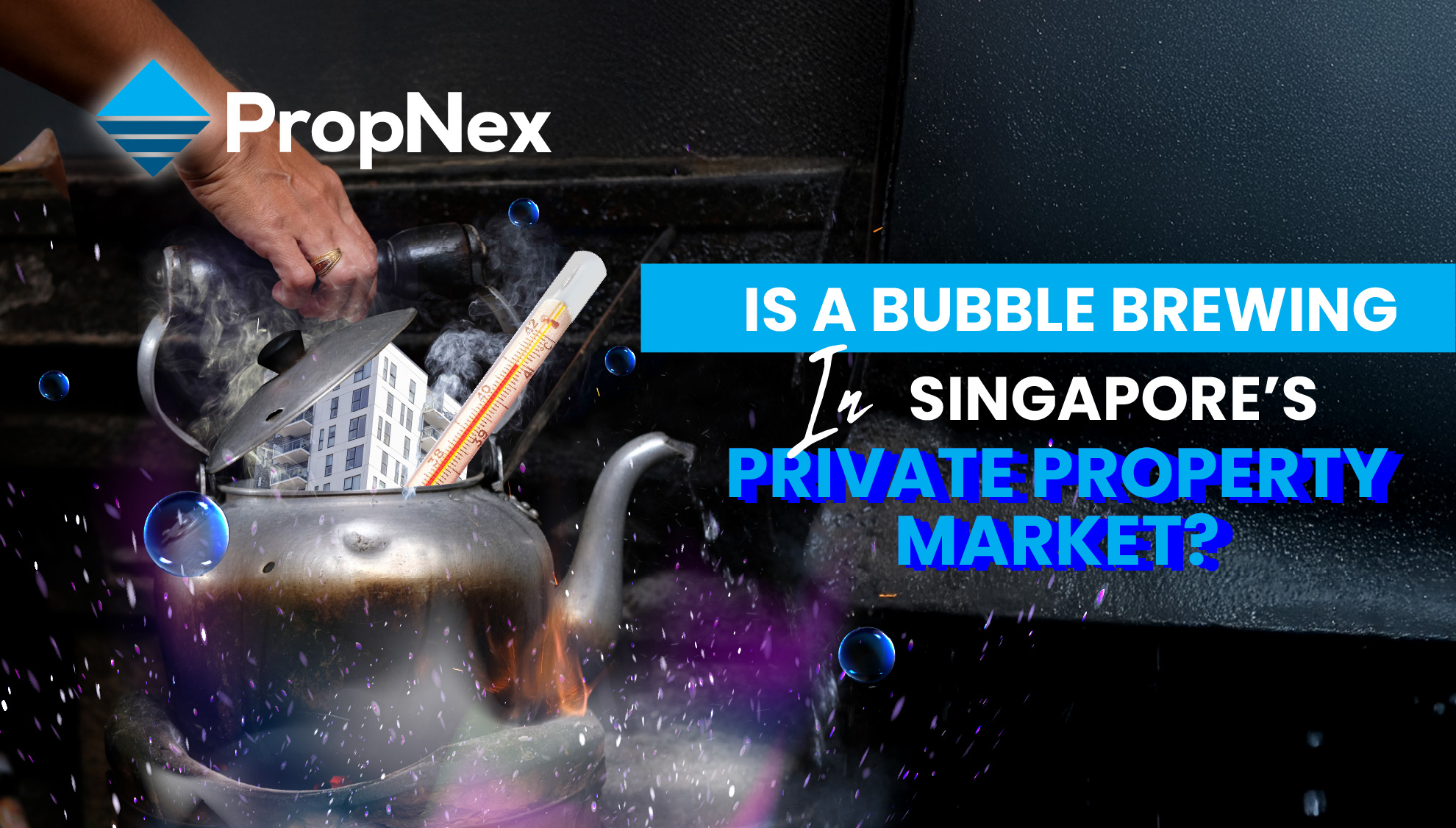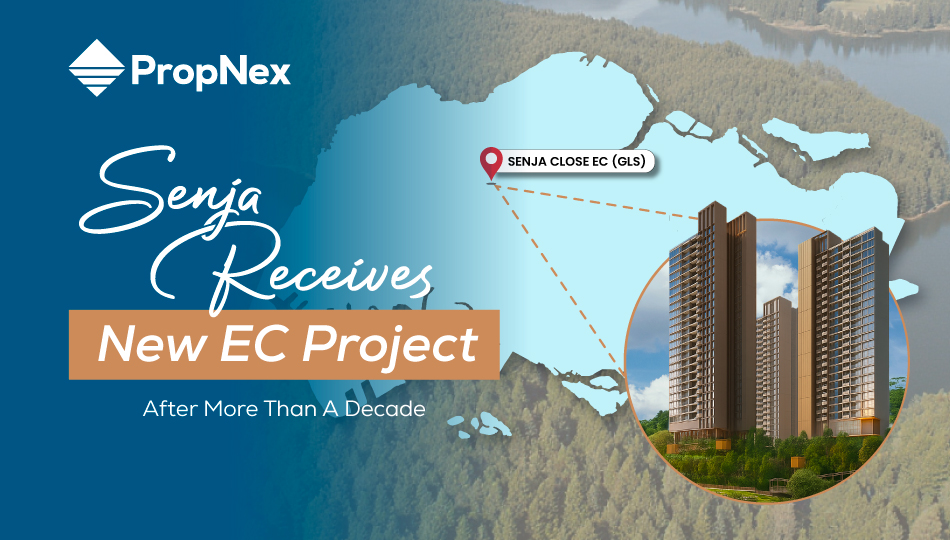PropNex Picks
|August 12,2025Is A Bubble Brewing In Singapore's Private Property Market?
Share this article:
Let's be honest - if you've been following Singapore's property scene, it probably feels like price only go one way:
Okay, maybe no one else is really saying it out loud - but with record-breaking prices, intense new launch activity, and the government's surprise hike in Seller's Stamp Duty (SSD) from July 2025, you can't help but wonder: is Singapore's private property market overheating? And if so, could it burst?
Each section breaks down key aspects of the market today and how you should be reading the signs - not just the headlines.
A property bubble isn't just about prices being high. It's about unsustainable growth driven by excessive speculation, where buyers enter the market expecting rapid price appreciation and easy profits. When demand slows or credit tightens, the inflated prices collapse - often causing widespread financial distress.
Economists often point to two ratios as early warning signs: price-to-rent and price-to-income. When these metrics grow too quickly without underlying economic support, it's a red flag. In Singapore's case, prices have indeed climbed - but rental demand and income growth have not entirely decoupled from these gains, keeping the bubble risk more muted.
Instead of unchecked speculation, what we're seeing is a surge largely led by demand fundamentals - local upgraders, new citizens, and long-term investors. This is supported by:
Strong regulatory oversight, including cooling measures like ABSD, TDSR, and the newly revised SSD
Chronic land scarcity, limiting the pace at which new homes can be built, especially in prime zones
A cultural preference for homeownership and long-term asset holding
In other words, while the term "bubble" might seem tempting given the headlines, Singapore's property market is arguably one of the most tightly managed in the world.
That doesn't mean prices can't dip or that the market can't slow down. But the idea of a dramatic burst feels unlikely - because it's a bubble the authorities never let fully inflate.
Source: The Business Times
Singapore's private property market isn't rising without reason. There's a cocktail of forces still supporting prices, despite visible slowdowns.
According to URA's Q2 2025 data:
Prices rose just 0.5%, the slowest pace in three quarters
The CCR led growth with 2.3%, while RCR price dipped 1.1%
Transaction volumes dropped nearly 40% compared to Q1
Why the resilience?
Falling interest rate: Lower borrowing costs have reignited buying interest, especially among those who held back during peak rates.
FOMO-driven upgraders: Many existing HDB owners are worried they'll be priced out of private property permanently, spurring urgency.
Wealth inflows: Singapore continues to be viewed as a safe asset haven amid global geopolitical tension and economic uncertainty.
Tight supply pipeline: Fewer new launches and land parcels mean buyers face limited options - supporting price resilience even in a slower market.
That said, recent numbers also suggest momentum is cooling. In May 2025, new private home sales fell to just 312 units - the lowest monthly tally this year - largely due to a lack of new project launches. Despite this, analysts still expect 7,000-8,000 units to be sold in 2025, buoyed by healthy fundamentals and pent-up demand.
Looking ahead, supply is expected to increase. URA's H2 2025 GLS programme includes nearly 9,800 private homes, and there are more than 56,700 units in the overall development pipeline. In fact, the Confirmed List supply for the first half of 2025 is around 60% higher than the 2021-2023 average, suggesting the government is actively releasing land to meet demand and avoid overheating.
In short, it's not a free-for-all. It's a cautious, demand-led market that's still very active - especially for homes with strong location fundamentals.
Source: The Straits Times
On 4 July 2025, the government reinstated a tougher SSD framework:
Sell within 1 year: 16%
Within 2 years: 12%
Within 3 years: 8%
Within 4 years: 4%
This isn't just a mild tweak - it's a clear move to dampen short-term speculation and restore a sense of discipline to the market. The policy, announced jointly by the Ministry of National Development, Ministry of Finance, and Monetary Authority of Singapore, extends the holding period from 3 to 4 years, with substantially higher tax rates for those who sell before then.
Analysts have called this a "warning shot" to speculative behaviour - particularly in the luxury segment - where buyers may be treating property more like tradable assets than long-term homes. While traditional 'flipping' is rare in Singapore due to strict cooling measures, the government appears intent on curbing short-term gain strategies, especially in the CCR.
Paired with existing cooling measures like ABSD and TDSR, the SSD hike forms a powerful barrier against unchecked price surges, reinforcing the message that property in Singapore is a long-term commitment - not a fast-money asset class.
While the market isn't in a speculative frenzy, one major concern looms large: affordability.
Here's where the strain shows:
Singapore's private home price-to-income ratio now stands at 13.7 - more than double the global benchmark of 5. This stark figure underscores how entry-level private homes are increasingly slipping out of reach for the middle-income class.
Between 2014 and 2024, median monthly income in Singapore rose from $3,276 to $4,860 - a 48% increase over ten years. While this reflects steady income growth, property prices have outpaced wages by a significant margin, widening the affordability gap and making asset progression tougher for many.
Even with interest rates easing, monthly mortgage obligations remain high. Many young couples or first-time buyers find themselves needing to turn to family support, delay property purchases, or opt for longer loan tenures that stretch into retirement age. This highlights why it's so important to start early - something we explore in more detail in our article on why starting young matters in property investment.
In the long run, this pressure could be the key governor on demand - especially in the mass market segments outside the CCR.
Absolutely - but likely in a soft landing, not a hard crash. Potential triggers include:
Global recession
A significant downturn could impact job stability, particularly in sectors tied to global trade, finance, or tech. Singapore may be edging towards a technical recession, with economic growth softening amid global uncertainties like US tariffs and weakening external demand. This environment tends to weigh on consumer confidence and transactional activity.
In such conditions, household confidence drops - and that dampens both home-buying sentiment and investor activity. Developers may also delay launches or price more conservatively. Historically, downturns like the 2008 Global Financial Crisis led to a 20% fall in prices, while the 2020 COVID-19 slowdown saw a brief pause before the market surged. Luxury and investment-grade properties could see a pullback first as buyers adopt a wait-and-see approach.
Oversupply in fringe locations
If too many OCR or RCR projects enter the market in a short span, demand could fail to absorb the inventory. This often leads to more aggressive discounts, delayed launches, or stagnant pricing in those districts. Buyers may also become more selective, favouring centrally located projects or those with better transport access and amenities.
Policy tightening
Source: Channel News Asia
If the government introduces more cooling measures - such as further ABSD hikes, lower LTV limits, or stricter TDSR caps - it could make homeownership less accessible. This would most significantly impact first-time buyers and upgraders who rely on maximum leverage. The result? A slower transaction pipeline and more cautious behaviour across the board.
But here's the key: Singapore's property cycles tend to correct through volume before price. That means instead of dramatic price collapses, we usually see sales slowing down, showflats becoming quieter, and developers gradually adjusting pricing expectations. Resale activity also dips before prices follow.
This pattern of gradual moderation isn't accidental - it reflects the government's long-standing macroprudential strategy. By using tools like ABSD, LTV limits, TDSR, and now the SSD hike, policymakers are actively managing demand without destabilising the market.
As a result, corrections tend to unfold as calm recalibrations rather than chaotic crashes - helping both buyers and developers navigate market shifts with more clarity and confidence.
Probably not.
Singapore's property isn't an unregulated free-for-all. Every spike is met with policy brakes. Every surge is watched closely. The new SSD move proves the government remains ready to act before things spiral.
That doesn't mean prices will always go up. But it does mean a sharp, chaotic collapse is extremely unlikely.
That real question now isn't when the bubble will burst - but whether we're already entering a new phase: one of moderation, sustainability, and longer holding periods.
So, if you're in the market, take a step back and assess your goals. Consider attending our consumer empowerment seminar (CES) to gain valuable insights and proven strategies that can help you make informed real estate decisions. Singapore's property landscape is changing, but the fundamentals remain strong for those who are intentional and informed. The winners aren't the ones chasing quick profits - they're the ones who strategise, stay patient, and adapt with clarity and confidence.
Views expressed in this article belong to the writer(s) and do not reflect PropNex's position. No part of this content may be reproduced, distributed, transmitted, displayed, published, or broadcast in any form or by any means without the prior written consent of PropNex.
For permission to use, reproduce, or distribute any content, please contact the Corporate Communications department. PropNex reserves the right to modify or update this disclaimer at any time without prior notice.









